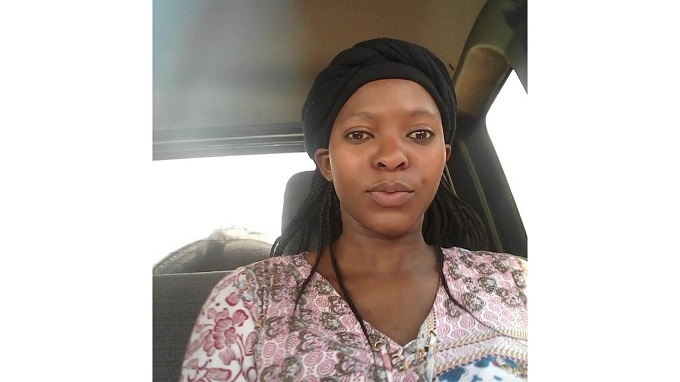White bride on rural stoep…Bile sprinkling, ancestral rites as Mangwe welcomes a white daughter-in-law

Nqobile Tshili, Chronicle Reporter
ONE of the hallmarks of a marriage in the Ndebele culture is ukucola, a ritual to introduce the daughter-in-law to the ancestors which is conducted by the groom’s family.
The process involves sprinkling bile from a goat on the daughter-in-law’s stomach while immediate family members communicate with ancestors of the groom.
This practice is common among the Ndebele but has probably not involved Ndebele men who marry whites largely because whites do not believe in African traditional cultures.
A white wedding is usually enough especially when a Ndebele man marries a white woman.
It was however different for Advocate Mabasa Sibanda (38), a lawyer and an acting High Court judge in South Africa. The man from Linda village in Mangwe, Matabeleland South, married a white woman the traditional way with all the ceremonies and rituals of the Ndebele culture observed and celebrated.
When Advocate Sibanda married his sweetheart, Miss Hannine from Port Elizabeth, he ensured that all the rituals that are conducted in the Ndebele culture to welcome a daughter-in-law were performed.
The couple first solemnised their union through the western white wedding and thereafter conducted the rituals for Hannine to be recognised as Mrs Sibanda by Advocate Sibanda’s clan.
Last Saturday into Sunday, the family conducted a traditional wedding ceremony which saw Advocate Sibanda’s wife performing acts expected from a daughter-in-law.
From Johannesburg, Hannine came to the family homestead, where she was introduced to the rest of the family where rituals such as ukucola were performed.
She also gathered firewood and was made to lie on top of the gathered firewood as she waited to be given a token of appreciation in line with the cultural rites.
Mrs Sibanda was also given a kitchen with pots that she is expected to use when cooking for her husband and the rest of the family.
Unlike other women who are shy during performance of such cultural rites, Mrs Sibanda was extremely excited and danced along as the Sibanda family entourage welcomed her home.
It was a celebration like no other and as someone with little knowledge on how the rituals are performed, a senior daughter-in-law was seen whispering to her on what to do next.
“Badala nanzi inkuni,” she said, showing the aunties the firewood that she had gathered, shortly before she lay on top of it. She only left after she was showered with gifts.
She was given a cow for the firewood she had gathered.
Her cousin, who had flown from South Africa to witness the traditional wedding ceremony, Mr Jonker Fourie said for them it was a new world altogether as they had never participated in Ndebele traditional marriage rituals.
“This is something totally different for us. We are the only ones from her family who could come here. It’s a privilege to be here and experience all of this. We are from Port Elizabeth, her hometown where she was born. So we were excited to be part of this process,” said Mr Fourie who had brought his family.
He said the Ndebele traditional marriage ceremony and the performance of cultural rituals was an eye opener.
“They had a western wedding in Johannesburg and it’s very nice for us to be here and experience the cultural wedding. It’s not in Bulawayo, it’s at the homestead where a proper cultural wedding is being done, something we didn’t know,” he said.
The bride, who preferred to be called Mrs Sibanda, said participating in the Ndebele marriage rituals was important as it solidified her new position as umakoti.

She said it was also important to embrace the culture of her husband as it is a confirmation that she respects her in-laws.
“It’s an honour to be part of this. It was fun and interesting (to participate in this) I had mamdala explaining what to do and she would explain what I had to do, although I had been briefed on what I was to do before hand,” she said.
Mrs Sibanda said she had no prior exposure to the Ndebele wedding ceremony and cultural rituals.
“It is my first exposure to a Ndebele wedding and my first as makoti. It means a lot because it is family and all these people from the core family have seen him since he was a boy. So it is an extension of welcoming me so it means a lot,” said Mrs Sibanda.
Advocate Sibanda said while his wife is Afrikaans, it was important to respect her and his cultures hence their decision to conduct both weddings.

Advocate Mabasa Sibanda (38), a lawyer and an acting High Court judge in South Africa.
“We need to respect each other’s cultures. She is Afrikaans and I’m Ndebele and as much as we celebrate her culture, we need to celebrate our (Ndebele) culture. We need to observe things that are important to us, our family and our culture. The significance of this to me is that we are welcoming her to our home, we are receiving her, we are saying nguye umakoti and show her around the kitchen and where our ancestors are buried,” said Advocate Sibanda.
“She is from a Christian background so we had a ceremony in Johannesburg where we celebrated her in the manner that her people do. We had a white wedding and this one holds more for me personally. It holds more as it is culturally significant for me.”
Advocate Sibanda did not pay lobola as it is a culture that is not practised by his in-laws.

umakoti
“But what matters is how the families commit to interact with each other. That is the whole purpose of the lobola; it’s not about cattle but the process of bringing families closer together,” he said.
Advocate Sibanda’s father and businessman, Mr John Linda Sibanda said performing traditional rituals is important in keeping the Ndebele culture alive.
“I think it’s very important to keep our culture and understand who we are and where we come from. That helps us to shape where we are going. Most of the time they say indlela ibuzwa kwabaphambili. So, it’s important that we preserve our cultural rites because it gives dignity to our lives, it makes our lives straight forward. In doing so we will be able to even teach our children to continue on that path,” said Mr Sibanda.

He said different nations and ethnic groups including whites, observe and respect their cultures.
“The Irish are still strong in their cultures and Scottish still wear their skirts (kilts). So, all the nations have that kind of life so we have to uphold our culture.”
Mr Sibanda said by giving the daughter in law a kitchen they were symbolically telling her in line with African tradition that she is expected to cook for the family.
“She is being given the kitchen, it doesn’t have much in it, she is the one who will buy stoves and so forth we are just giving her amabhodo amakhulu so that she can cook using the fire because meals cooked using fire are the best meals. The important message that she should know is that she has to cook for the whole family, not just her husband. Because nxa umuntu eyenda kayendeli endodeni but to the family. That is why the family is welcoming her,” he said.

Mr Sibanda said in the Ndebele culture a daughter-in-law is also introduced to the ancestors.
“Later on in the evening, she is going to be introduced to our ancestors, seyamthela ngenyongo (sprinkle bile on her) connecting to our ancestors hence they should not be surprised seeing her roaming around the homestead,” said Mr Sibanda.
He said conducting the traditional ceremony was a way of showing that all cultures are equal. – @nqotshili










Comments